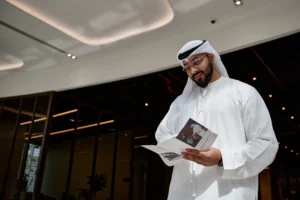Gambling has traditionally been a taboo subject in the Middle East, with authorities across the region strictly prohibiting the activity.
The apprehension is rooted in their religious and social conservatism, and governments have enforced strict legal codes to discourage participation.
However, the United Arab Emirates (UAE) has reconsidered its stringent rules, and the shift will send a ripple through the Gulf region and beyond.
The UAE is Changing the Status Quo
The UAE inaugurated the General Commercial Gaming Regulatory Authority (GCGRA) in September 2023 in a move which turned heads globally.
The government tasked the GCGRA with licensing and regulating commercial gaming. They were asked to establish a framework for operations in this nascent industry.
Not long after, news broke that Wynn Resorts would build an integrated venue in Ras Al Khaimah with a physical casino. Many people believe this will open the door for legalised online gambling.
The UAE has never been one to rush into reforms. Other moves which have liberalised the economy have happened at a calculated pace. The same is the case with gaming.
Foreign gaming firms are reportedly waiting for the green light to pounce. International casino brands are looking out for joint ventures and technology partnerships.
Software providers are also preparing to deliver the digital infrastructure for this regulated online gaming ecosystem. The potential for success is massive.
A legal, state-monitored gambling industry will bolster tourism, earn the UAE millions in revenue, create jobs and reduce its reliance on hydrocarbons.
Kuwait’s Lost Revenue and Offshore Licenses
One nation that needs to take a leaf from the UAE’s books is Kuwait. The Gulf country has remained a staunch opposer of legalised and regulated gambling.
However, the irony is that several Kuwaiti citizens already participate in online betting on platforms operating under licenses issued in foreign jurisdictions.
The best online casino in Kuwait operates under an international license, meaning the government misses out on lucrative tax revenues.
The actual numbers are difficult to verify, but millions of dollars that should go to the government purse are going elsewhere. Creating a legal, regulated gambling framework is the pragmatic course of action for Kuwait.
They must take a cue from the UAE and design a regulatory model that prioritises responsible gambling and plugs this significant tax revenue leakage.
Taking the lead here goes way beyond gambling. Middle Eastern countries have been trying to diversify their income streams and liberalise traditional sectors in recent years.
Gulf states are staring down the barrel as the world pivots towards renewable energy, and the race has been on to find alternative streams of revenue and relevance.
Some countries have designed economic visions around tourism, entertainment and technology to survive. Regulated gaming is another profitable sector they must consider.
Saudi Arabia has spent the past few years breaking out of its conservative cocoon, lifting its cinema and concert ban. Women are also now allowed to drive amid several other societal changes.
Gambling remains banned under Saudi law. However, policymakers will likely reconsider their position on gambling if the UAE successfully establishes a controlled and profitable gaming sector without impacting the social and cultural fabric.
Qatar and Bahrain will not waste time before following suit if this happens. There is an intense competition between each of these Gulf Cooperation Council (GCC) states.
The Importance of Regulation over Repression
The UAE has been careful with its decisions around gaming, ensuring strict oversight, digital traceability and responsible gaming measures.
The GCGRA plans to allow only vetted gambling operators into the sector. They will enforce strict age restrictions and identity verification, alongside plans to use artificial intelligence (AI) to ensure responsible gambling and fortify security.
Creating a safe environment where gamblers can enjoy their passion responsibly is the ultimate goal, and other Middle Eastern nations should closely study this model.
Nationals across the region are already gambling. Why not give them credible platforms to enjoy themselves without allowing massive tax revenue to slip away?
Other Middle Eastern countries may not copy the UAE formula verbatim, but a few tweaks will allow them to balance heritage and modernity.
Kuwait and nations that have refused to concede any ground could be left behind economically if they are not careful.






















